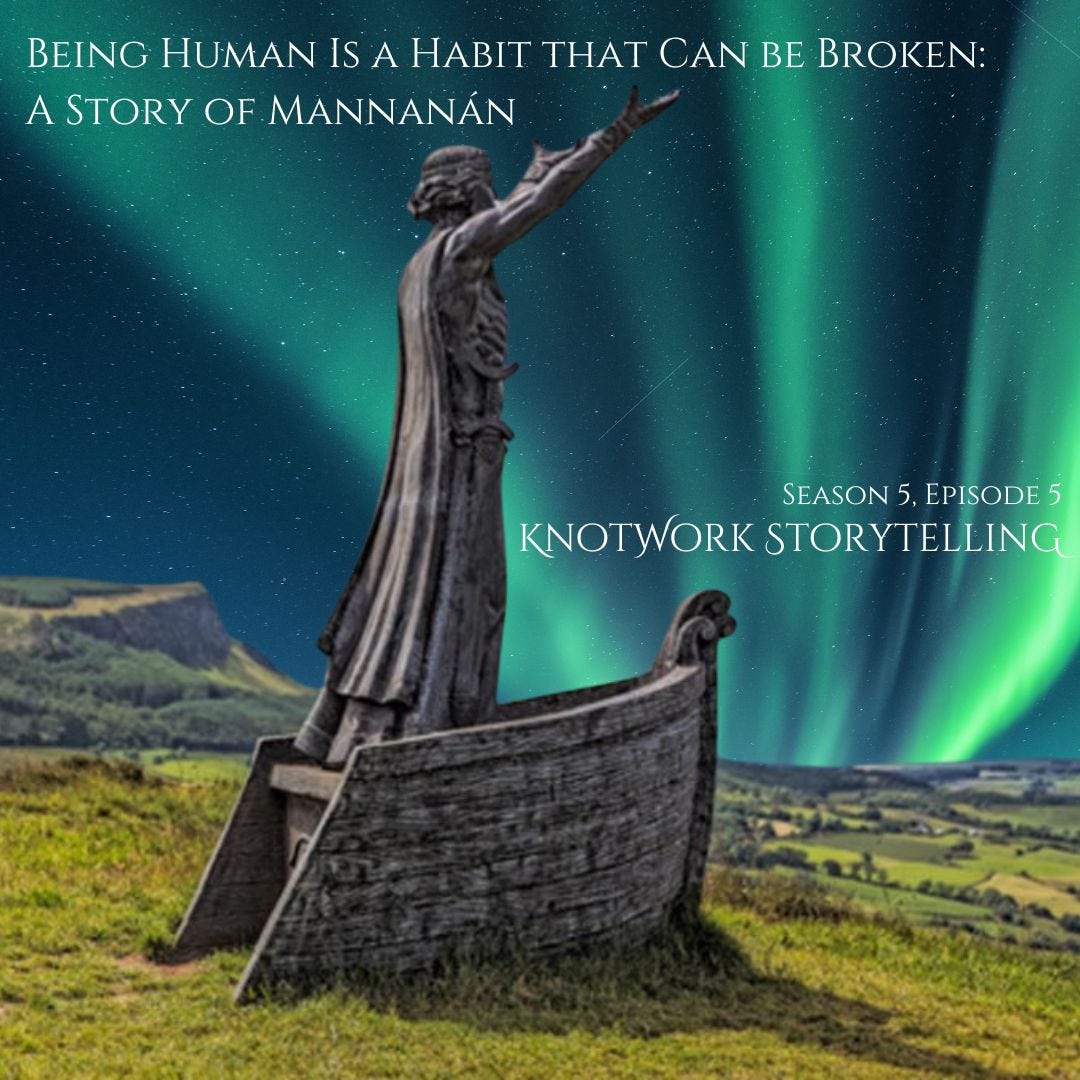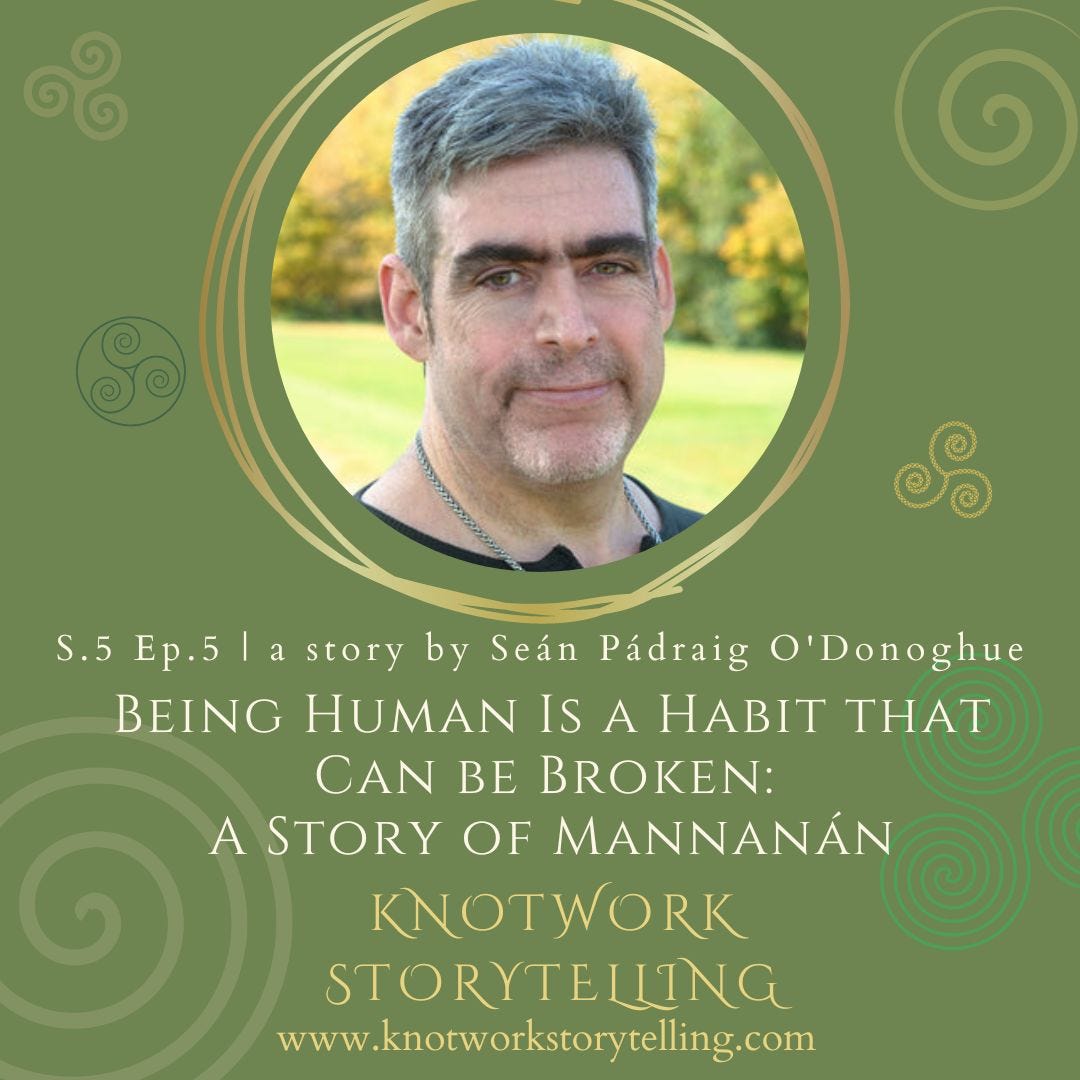Being Human Is a Habit that Can Be Broken
A guide to Seán Pádraig O'Donoghue's tale of Mannanán on KnotWork Storytelling
Seán Pádraig O'Donoghue returns to KnotWork Storytelling with a story of Mannanán in a KnotWork Storytelling episode we’re calling “Being Human Is a Habit that Can Be Broken.”
The episode title is borrowed from a line from the Irish writer John Moriarty, whose work is inspiring so many people right now, but particularly Seán who refers to the philosopher often in his forthcoming book, The Silver Branch and the Otherworld: Forest Magic with Plant and Fungi Allies.
Moriarty is just one of many writers, mythological figures, and concepts that Seán mentions during this conversation. Marisa chose not to break the gorgeous flow of this dialog to ask for some of the more basic details, so this post serves as a sort of listeners’ glossary to accompany the episode.
Mythological Characters and Events
Mannanán is one of the oldest of the Irish gods – he and the Cailleach and Crom Cruach were all in Ireland before the coming of the Tuatha Dé Dannan. He is the son of the great sea of being and a teacher and mentor to poets and heroes and kings. He is also a trickster figure who sometimes walks among humans disguised as a fool to test the hospitality their leaders show to strangers.
Cormac Mac Airt was one of the great high kings of Ireland. As a child, he was taken for a time by wolves, until his mother journey to save him. You can hear this story in Season 5, Episode 2 of KnotWork Storytelling with Karina Tynan’s story, Achtan, A Brave Mother’s Tale. Later in his life, four wolves guarded him. His father’s name, Airt, is an old Irish word which means “bear” and “stone” and “god” and “strength.”
Columcille was an Irish saint known especially for his role in the tradition of creating beautiful illuminated manuscripts. He was also responsible for ending the role of women as warriors, lowering their status in society.
The Milesians were the semi-mythical ancestors of the Irish people who came north from Spain. Amergin was their great poet whose magical incantations won the allegiance and respect of the women who were the living spirits of the land. Listen to Brian Walsh’s story in Season 5, Episode 3, The Coming of the Sons of Mil. Marisa tells a version of the story from the women’s perspective in Three Goddesses Observe the Coming Change.
The Curse of Macha was mentioned during the conversation in terms of looking at the North from a mythic standpoint. Macha was a great queen in Ulster whose husband boasted that his wife could beat any horse in a race, even when she was nine months pregnant. She won the race and gave birth at the finish line. In her fury at the foolishness and disrespect of her husband and the other men who allowed the race to go forward, she cursed the men of Ulster that in their times of greatest need they and all their male descendants would experience the pains of a woman giving birth. Hear Marisa’s version of the story: Macha: The Birth of a Heroine.
Irish Words & Phrases
Dúchas is a word that means many things in Irish including birthright, instinct, and connection to the land. It is also one of the words used to refer to tradition, especially to folk traditions. Seamus Heaney obliquely referenced dúchas in The Cure at Troy when he spoke of the time when “hope [dóchas] and history rhyme.”
Gardaí dúchas -- “Gardaí” means “guardians” and “gardaí dúchas” is a term Seán coined for self-appointed guardians of the Irish tradition who insist that anyone whose understanding of gods or heroes or stories does not conform with the understandings gleaned from either medieval text or mid-twentieth century folklore is wrong. It is a bit of a play on words because “gardaí” (or “guards”) is also the word most Irish people use to refer to the police who are officially called the “Gardaí Siochána.”
How to give your name in Connemara Irish: Not the standard Irish “Seán is aimn dóm” but “Seán atá orm.” In literal translation, you speak of your own name being upon you. Emotions and colors are commonly spoken of in a similar way. Instead of saying “I am happy” – “Táim athás” – most Irish speakers say “Tá áthas orm” or “happiness is upon me.”
Contemporary Figures and Events
Rune Hjarnø Rasmussen is a Danish scholar and writer whose work centers around Nordic animism.
Billy Mag Fhloinn is an Irish folklorist, archaeologist and musician.
Mosab Abu Toha is a Palestinian poet now living in exile in Cairo. He was a student and friend of the great Palestinian scholar and poet Refaat Alareer who was assassinated by the Israeli Defense Forces in December, 2023.
Michelle O’Neill is the first Catholic and the first Republican to hold the highest elected position in the North of Ireland. She is a member of Sinn Feín, the largest political party advocating for a united Ireland. In the Irish context, a Republican is someone who supports an independent, unified Ireland in which all people’s basic economic and social needs are met.
Mary Loy McDonald is the leader of Sinn Feín for all of Ireland. There is a strong chance that she will be the next Taoiseach (Prime Minister) of the Republic of Ireland.
John Moriarty was an Irish philosopher who blended animism, folklore, and unorthodox Christianity In unique ways. This interview and this lecture offer a great introduction to his work.
The Easter Rising: On April 24, 1916, Easter Monday, farmers and workers led by poets and teachers and musicians and labor unionists staged an armed uprising in Dublin and proclaimed an Irish republic with equal rights for all men and women. The leaders were executed that May, but the uprising set the stage for the struggle that would bring freedom to 26 of Ireland’s 32 counties. The rising was mentioned in the conversation in terms of its closeness to the sacred festival to Bealtaine that year.
Animist traditions view the world and all the beings within it as alive and intelligent and seek to create and maintain healthy, respectful, reciprocal relationships with animals and plants and fungi and stones and rivers and oceans and stars and Otherworldly beings.









There were so many moments of soulful resonance in listening to this particular episode. About a week ago (during a Writer's Knot session, actually), I wrote a few lines around a vision I had of the womb-like creative potential held within the cavernous space around the heart. Seán's discussion of the heart (and the space around the it) being a portal of the Sídhe was particular awe-striking for me - and had me pondering on the woven threads of imbas within the creative consciousness. How could I 'see' something with my Otherworldly eye and then shortly after hear the wisdom of another speaking to it directly? It was an incredibly experience to see (and feel) the thread connect these for me. (I don't know if that makes sense, maybe this is a great example of the logical human habit)
I am just beginning to learn about Mannanán but something spoke to my soul when I learnt about the féth fíada. It resonated as deeply nourishing and protective; like waters of the womb. I'm excited to see how Mannanán's presence continues to roll into my life - his wisdom seems to be particularly potent and poignant these days (especially since he has risen into my creative experience several times over the past months).
I too would also love to learn how to introduce myself in the Connemara way. The poetic impermanence of speaking my name (of this lifetime) in such a way really resonated - I may need to go back for another listen to see if I can learn it.
Míle buíochas Marisa and Séan for the soulful depths we were invited to journey upon with this episode - incredible, incredible wisdom here.
A wealth of knowledge here! Love the note about how to give your name and express an emotion in Connemara Irish. Both being something upon you, impermanent and subject to change. The possessiveness in English of “I am…” has always been too rigid for my taste!